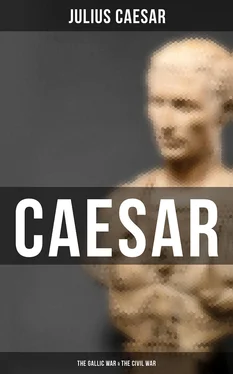1 ...8 9 10 12 13 14 ...18 IX.—There was a marsh of no great extent between our army and that of the enemy. The latter were waiting to see if our men would pass this; our men, also, were ready in arms to attack them while disordered, if the first attempt to pass should be made by them. In the meantime battle was commenced between the two armies by a cavalry action. When neither army began to pass the marsh, Caesar, upon the skirmishes of the horse (proving) favourable to our men, led back his forces into the camp. The enemy immediately hastened from that place to the river Aisne, which it has been stated was behind our camp. Finding a ford there, they endeavoured to lead a part of their forces over it; with the design, that, if they could, they might carry by storm the fort which Q. Titurius, Caesar's lieutenant, commanded, and might cut off the bridge; but, if they could not do that, they should lay waste the lands of the Remi, which were of great use to us in carrying on the war, and might hinder our men from foraging.
X.—Caesar, being apprised of this by Titurius, leads all his cavalry and light-armed Numidians, slingers and archers, over the bridge, and hastens towards them. There was a severe struggle in that place. Our men, attacking in the river the disordered enemy, slew a great part of them. By the immense number of their missiles they drove back the rest, who in a most courageous manner were attempting to pass over their bodies, and surrounded with their cavalry, and cut to pieces those who had first crossed the river. The enemy, when they perceived that their hopes had deceived them both with regard to their taking the town by storm and also their passing the river, and did not see our men advance to a more disadvantageous place for the purpose of fighting, and when provisions began to fail them, having called a council, determined that it was best for each to return to his country, and resolved to assemble from all quarters to defend those into whose territories the Romans should first march an army; that they might contend in their own rather than in a foreign country, and might enjoy the stores of provisions which they possessed at home. Together with other causes, this consideration also led them to that resolution, viz.: that they had learnt that Divitiacus and the Aedui were approaching the territories of the Bellovaci. And it was impossible to persuade the latter to stay any longer, or to deter them from conveying succour to their own people.
XI.—That matter being determined on, marching out of their camp at the second watch, with great noise and confusion, in no fixed order, nor under any command, since each sought for himself the foremost place in the journey, and hastened to reach home, they made their departure appear very like a flight. Caesar, immediately learning this through his scouts, (but) fearing an ambuscade, because he had not yet discovered for what reason they were departing, kept his army and cavalry within the camp. At daybreak, the intelligence having been confirmed by the scouts, he sent forward his cavalry to harass their rear; and gave the command of it to two of his lieutenants, Q. Pedius, and L. Aurunculeius Cotta. He ordered T. Labienus, another of his lieutenants, to follow them closely with three legions. These, attacking their rear, and pursuing them for many miles, slew a great number of them as they were fleeing; while those in the rear with whom they had come up, halted, and bravely sustained the attack of our soldiers; the van, because they appeared to be removed from danger, and were not restrained by any necessity or command, as soon as the noise was heard, broke their ranks, and, to a man, rested their safety in flight. Thus without any risk (to themselves) our men killed as great a number of them as the length of the day allowed; and at sunset desisted from the pursuit, and betook themselves into the camp, as they had been commanded.
XII.—On the day following, before the enemy could recover from their terror and flight, Caesar led his army into the territories of the Suessiones, which are next to the Remi, and having accomplished a long march, hastens to the town named Noviodunum. Having attempted to take it by storm on his march, because he heard that it was destitute of (sufficient) defenders, he was not able to carry it by assault, on account of the breadth of the ditch and the height of the wall, though few were defending it. Therefore, having fortified the camp, he began to bring up the vineae, and to provide whatever things were necessary for the storm. In the meantime, the whole body of the Suessiones, after their flight, came the next night into the town. The vineae having been quickly brought up against the town, a mound thrown up, and towers built, the Gauls, amazed by the greatness of the works, such as they had neither seen nor heard of before, and struck, also, by the despatch of the Romans, send ambassadors to Caesar respecting a surrender, and succeed in consequence of the Remi requesting that they (the Suessiones) might be spared.
XIII.—Caesar, having received as hostages the first men of the state, and even the two sons of king Galba himself; and all the arms in the town having been delivered up, admitted the Suessiones to a surrender, and led his army against the Bellovaci. Who, when they had conveyed themselves and all their possessions into the town called Bratuspantium, and Caesar with his army was about five miles distant from that town, all the old men, going out of the town, began to stretch out their hands to Caesar, and to intimate by their voice that they would throw themselves on his protection and power, nor would contend in arms against the Roman people. In like manner, when he had come up to the town, and there pitched his camp, the boys and the women from the wall, with outstretched hands, after their custom, begged peace from the Romans.
XIV.—For these Divitiacus pleads (for after the departure of the Belgae, having dismissed the troops of the Aedui, he had returned to Caesar). "The Bellovaci had at all times been in the alliance and friendship of the Aeduan state; that they had revolted from the Aedui and made war upon the Roman people, being urged thereto by their nobles, who said that the Aedui, reduced to slavery by Caesar, were suffering every indignity and insult. That they who had been the leaders of that plot, because they perceived how great a calamity they had brought upon the state, had fled into Britain. That not only the Bellovaci, but also the Aedui, entreated him to use his (accustomed) clemency and lenity towards them (the Bellovaci): which if he did, he would increase the influence of the Aedui among all the Belgae, by whose succour and resources they had been accustomed to support themselves whenever any wars occurred."
XV.—Caesar said that on account of his respect for Divitiacus and the Aeduans, he would receive them into his protection, and would spare them; but, because the state was of great influence among the Belgae, and pre-eminent in the number of its population, he demanded 600 hostages. When these were delivered, and all the arms in the town collected, he went from that place into the territories of the Ambiani, who, without delay, surrendered themselves and all their possessions. Upon their territories bordered the Nervii, concerning whose character and customs when Caesar inquired he received the following information: —That "there was no access for merchants to them; that they suffered no wine and other things tending to luxury to be imported; because they thought that by their use the mind is enervated and the courage impaired: that they were a savage people and of great bravery: that they upbraided and condemned the rest of the Belgae who had surrendered themselves to the Roman people and thrown aside their national courage: that they openly declared they would neither send ambassadors, nor accept any condition of peace."
Читать дальше












